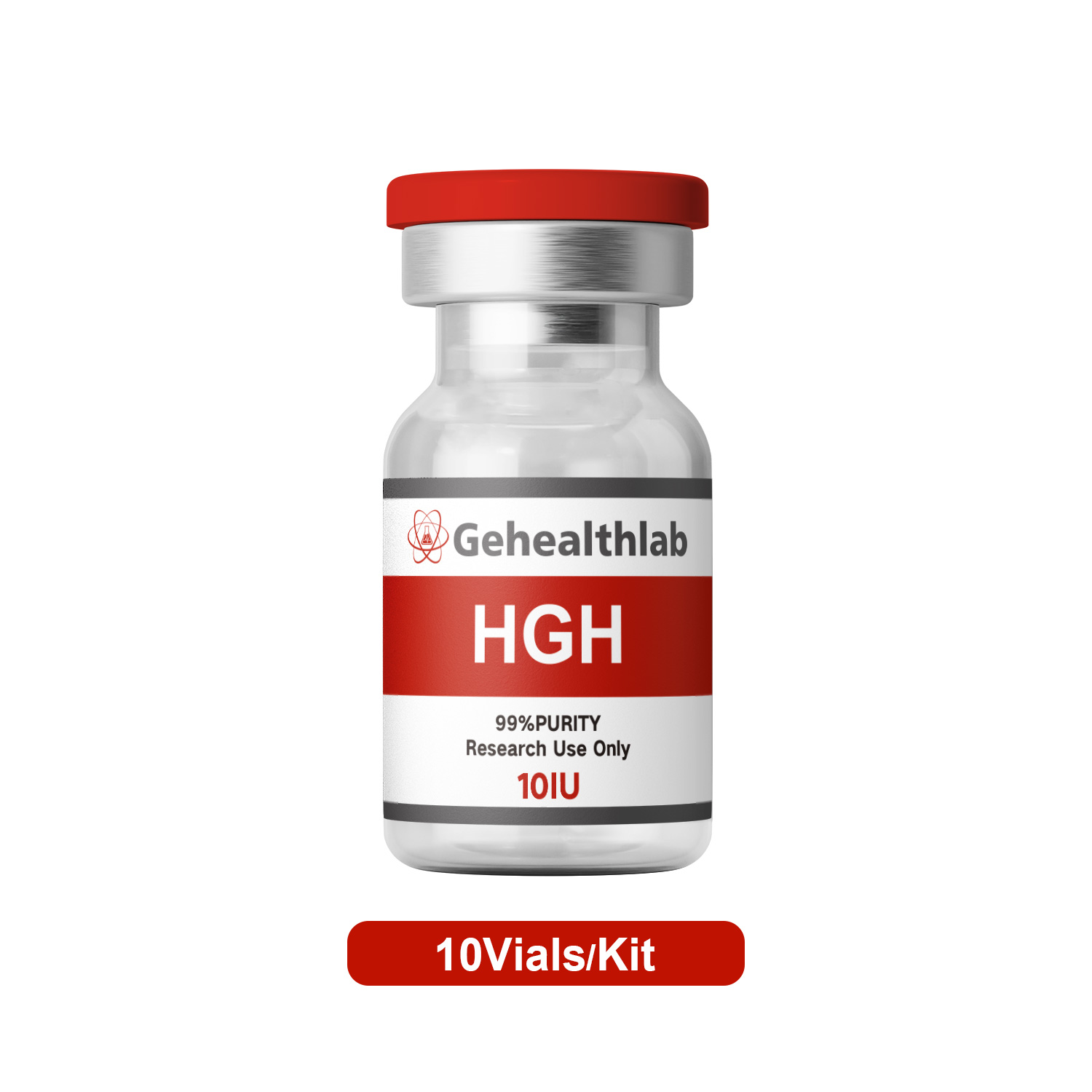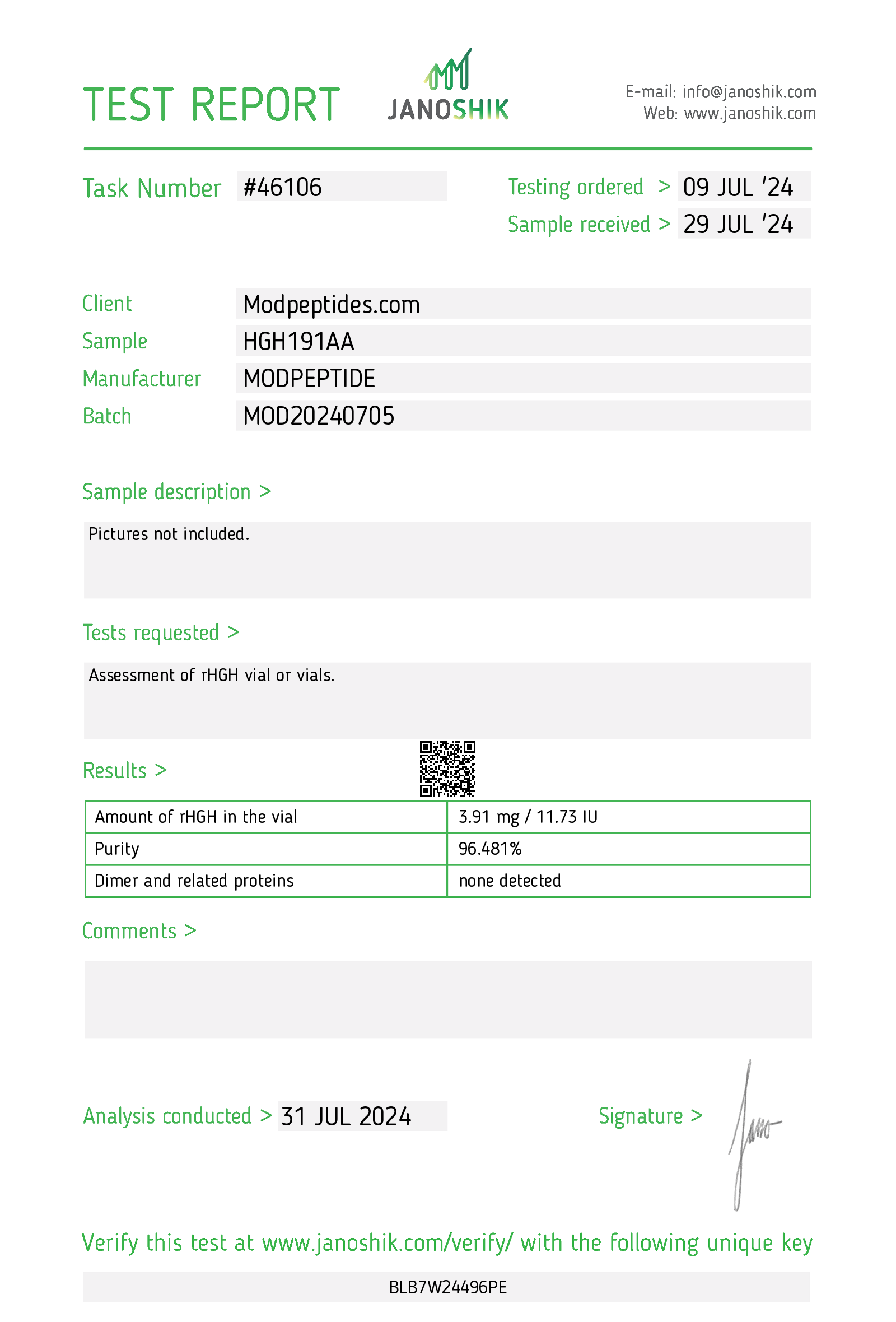HGH 191AA 10iu*10 vials
Each vial contains 10iu/3.7mg, 10 vials each kit
Purity 99%
Remark: product not including labels when shipping
-
Detail
What is Somatropin? Somatropin is a synthetic growth hormone-releasing hormone (GHRH) analog that has gained significant attention in growth hormone-related research. As a peptide hormone, Somatropin acts to induce the endogenous production and release of growth hormone (hGH). This unique property makes Somatropin a potentially relevant compound for various physiological activities, including tissue scarring, bone density, renal function, dementia, and seizure activity.
What are the Benefits of Somatropin?
Somatropin offers several potential benefits for individuals seeking growth hormone modulation. According to the abstract “Beyond the androgen receptor: the role of growth hormone secretagogues in the modern management of body composition in hypogonadal males”, by D.K. Sinha and A. Balasubramanian, the following benefits can be derived from study results:
- Increased Growth Hormone Production: Somatropin stimulates the body’s natural production and release of growth hormone. This regulated approach helps maintain the delicate balance of hormone levels, potentially reducing the risk of adverse effects associated with excess exogenous hGH.
- Enhanced Safety Profile: Studies have shown that Somatropin has a favorable safety profile compared to direct hGH injections. By stimulating the body’s own production of hGH, Somatropin allows for a more controlled and physiological approach to growth hormone modulation.
- Long-Term Use: Researchers have suggested that Somatropin may not be subject to tachyphylaxis, a process where the body becomes acclimatized to a compound and negates its action. This suggests that Somatropin may be suitable for long-term use, providing sustained benefits without the risk of diminishing effects over time.
- Regulated Growth Hormone Release: Somatropin acts on the pituitary gland to stimulate the release of growth hormone in a pulsatile manner, mimicking the body’s natural secretion pattern. This regulated release may contribute to a more physiological response, potentially reducing the risk of side effects associated with constant high levels of hGH.
What are the potential side effects of Somatropin?
While Somatropin is generally well-tolerated, there are potential side effects that may occur, including:
- Injection Site Reactions: The most common side effects of Somatropin injections are localized irritation at the injection site. This may include symptoms such as itching, sensitivity, swelling, pain, and redness. These reactions are typically short-lived and diminish as the body adjusts to the injections.
- Less Common Side Effects: Some individuals may experience less common side effects, including difficulty swallowing, dizziness, flushing, headache, nausea, rash, sleepiness, taste changes, and trouble sitting still. It is important to consult with a healthcare professional if any of these side effects persist or worsen.
Somatropin vs. hGH: Understanding the difference
Somatropin and direct hGH injections are two distinct approaches to growth hormone modulation. While both have implications for increasing hGH production, there are key differences to consider:
- Mechanism of Action: Somatropin stimulates the body’s natural production and release of growth hormone, while direct hGH injections involve the administration of synthetic growth hormone into the body.
- Safety Profile: Somatropin offers a regulated and potentially safer approach to growth hormone modulation, as it mimics the body’s natural secretion pattern. Direct hGH injections, on the other hand, may carry a higher risk of adverse effects associated with constant high levels of exogenous hGH.
- Long-Term Use: Somatropin may be suitable for long-term use, as it is believed to be less prone to tachyphylaxis. Direct hGH injections may require careful monitoring and consideration of potential risks associated with sustained high levels of hGH.
Who should avoid Somatropin?
While Somatropin is generally well-tolerated, there are certain individuals who should avoid its use. This includes:
- Allergic Reactions: Individuals who are allergic to Somatropin or any of its components should not use this medication. It is important to inform your healthcare provider about any known allergies before starting Somatropin treatment.
- Untreated Hypothyroidism: Individuals with untreated hypothyroidism may require additional screening and monitoring before considering Somatropin treatment. Consultation with a healthcare professional is crucial to determine the suitability of Somatropin in such cases.
- Pregnancy and Breastfeeding: Somatropin is not recommended for use during pregnancy or while breastfeeding. It is important to consult with a healthcare professional to discuss alternative options if you are pregnant, planning to become pregnant, or breastfeeding.
In conclusion, Somatropin presents a promising avenue for growth hormone modulation, offering potential benefits such as increased growth hormone production, enhanced safety profile, and potential for long-term use. Understanding the potential side effects, as well as the differences between Somatropin and direct hGH injections, is crucial in making informed decisions regarding growth hormone modulation. Consulting with a healthcare professional and obtaining research-grade Somatropin from a trusted source like Ghealthlab can ensure a safe and reliable approach to your scientific endeavors.
-
Customer ReviewsNo comments


